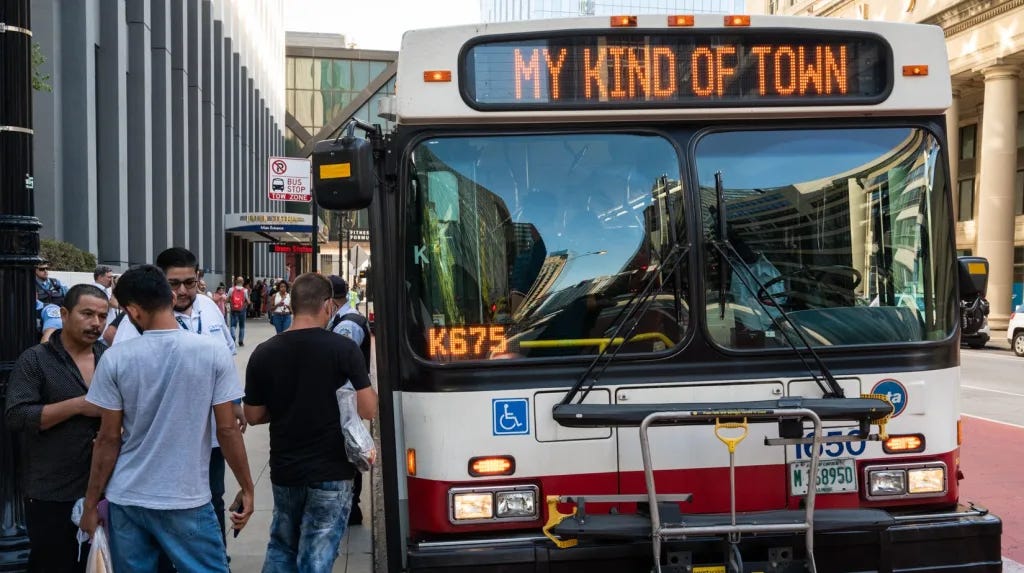One-click away from ruin: the gig economy and the hidden costs of convenience
Are we letting convenience blind us to the real harm of Uberization?
In an alarming sign of the times this week, the Chicago Sun-Times reported that Uber Eats and Postmates agreed to pay $8.5 million to struggling Chicago restaurants, along with $1.5 million the city itself, to settle claims that the companies, which merged in 2020, ignored a 15 percent delivery fee cap and listed restaurants on their platform without consent.
Already reeling from pandemic closures and restrictions, Chicago restaurants face the one-two punch of increased use of third-party delivery services like the aforementioned Uber Eats and Postmates, along with Grubhub and DoorDash. The latter two companies also face active litigation from the city.
Restaurant owners have long complained about third-party delivery services. Food can arrive late, cold or not at all, and independent restaurants, not the third-party delivery services, end up with negative reviews and damaged customer relations.
This most recent news represents just the tip of the iceberg when it comes to issues with the so-called “gig economy,” a term referring to the use of independent contractors, online platform workers, contract firm workers, on-call workers, and temporary workers who enter into formal agreements with on-demand companies to provide services to the company's clients.
The explosion of these services has even led to the coining of a term: uberization. Referring to the company Uber, which started in 2009 as a ridesharing service and has since moved into the food delivery and courier industry, uberization and the gig economy stretches into many parts of the traditional service and hospitality industries.
Examples include:
Rideshare services like Uber and Lyft
Delivery services like Postmates and Instacart
Car rental services like Turo and Getaround
Short-term home and room sharing services like Airbnb and VRBO
The convenience, accessibility and price of these services often draw consumers into the gig economy. Services like Turo and Getaround offer flexibility not generally found in traditional car rental services. Airbnb can be less expensive, more comfortable and more convenient than a hotel. Repeated use of services like DoorDash and Uber Eats can offer cost savings through coupons and even subscription services.
But faithful citizenship requires us to think of more than just our own convenience. While Uber and Lyft offer touch-button, instant gratification and often savings over traditional cab services, there’s an historical reason why cab services came into being and face regulations that gig economy replacements have thus far been able largely to skirt. An employee at a cab company has protections at work and does not shoulder the burden of vehicle maintenance.
In-house food delivery services at restaurants typically involve employees paid by the hour, not through piecemeal, on-demand agreements. And if you’ve ever gotten cold food from a late delivery, you know that an insulated storage bag, often provided by restaurants to delivery drivers but generally not an investment made by gig workers, means the difference between a pleasant meal and a microwaved disappointment.
Meanwhile, Airbnb has exacerbated a steadily worsening housing market for renters and first-time home buyers, with private companies buying up large numbers of rental properties and even single-family homes and converting them into short-term rentals for vacationers. You may think you’re renting from a family making a little extra money, but a study from the group Inside Airbnb found around one out of every four Airbnb hosts run two-thirds of all listings. Taking homes and apartments off the rental and ownership market has obviously not helped housing prices, leading to what some term the “Airbnb effect”.
The granddaddy of the gig economy, Uber, has faced increased scrutiny from labor rights advocates, but has had wins in the court of public opinion. For example, California’s Proposition 22, a ballot initiative that passed in November 2020, granted app-based transportation and delivery companies an exemption to the state’s labor laws by classifying their drivers as independent contractors, rather than as employees. Uber thus escaped requirements to provide employee benefits, including time-and-a-half for overtime, paid sick time, employer-provided health care, bargaining rights, and unemployment insurance.
Uber drivers received international attention with a global strike in 2019. The workers can’t unionize, but organized the strike through coordinated digital communications and old-fashioned word of mouth. Uber drivers were not alone. Lee Carter, at the time a Virginia state delegate and Lyft driver, joined the strike and promoted it on social media.
Ultimately, as consumers and workers, we must decide whether convenience alone is valuable enough to justify throwing workers under the Uberization bus. The gig economy won’t just hurt the workers who turn to it to make ends meet, but also consumers, often themselves working class and squeezed by inflation, who may find the profit motive of large companies seeking to cut corners is just no way to organize a market.
The Round Up
Here are the stories that caught our eyes this week and what they mean for the weeks ahead.
After The Buses: Meet The Migrants At The Center Of Texas’ Manufactured Crisis
After Texas Governor Greg Abbott and Florida Governor Ron DeSantis staged a political stunt this year, sending thousands of migrants and refugees to Democratic Party strongholds like New York City, Washington, D.C., and Chicago with little to no notice, local officials, human rights activists, non-profit groups and concerned local residents have worked to help find permanent homes, social services and jobs for the influx of would-be Americans.
Migrants disembark a CTA shuttle bus that reads “My Kind of Town” at Chicago’s Union Station after a 25-hour-long ride from Texas Sept. 9. Credit: Colin Boyle/Block Club Chicago
Block Club Chicago and Borderless Magazine profiled 10 people caught up in this manufactured crisis, allowing Chicagoans to get a glimpse into the lives of the individual people who often get treated like statistics.
Civic Update has highlighted this crisis already. Our own Mike Vick argued for Christians to take to heart Jesus’ call in Matthew 25:31–46 to treat those in need with dignity, grace and love.
If you’re moved to act, then head to World Relief: Chicagoland’s bus response portal to contribute and to volunteer your time.
How much Illinois' minimum wage will increase on Jan. 1, 2023
Illinois’ minimum wage workers will see a pay raise starting next year. The minimum wage hike will raise non-tipped wages to $13 per hour for employees ages 18 and up. The wage increase comes after a 2019 law established a statewide path to $15 minimum wage by 2025.
Tipped workers will get 60 percent of the hourly minimum wage, or $7.80, if they receive the difference in tips.
Workers under the age of 18 who work more than 650 hours in a calendar year must be paid at the same rate as an employee who is 18 or older. Younger workers who work less than 650 hours in a year will be paid a minimum wage of $10.50 per hour starting in January.
Chicago and Cook County already have a higher minimum wage than the rest of the state.
The Chicago minimum wage stands at $15.40 per hour since July 1 for businesses that have 21 or more employees. Employers with between four and 20 employees are required to pay $14.50 per hour.
Chicago's minimum wage for tipped workers is $8.70 for employers with four to 20 workers and $9.24 for employers with 21 or more workers. The city's minimum wage will increase every July 1 to match the rise in cost of living.
Last month, the powerful Service Employees International Union pressed Chicago candidates to back a $25 minimum wage. Frustration over inflation and the perceived foot dragging over national calls for a $15 minimum wage have led many workers’ rights advocates to demand even higher wages tied to inflation. The “Fight for $15” movement turned 10 years old this year, while the federal minimum wage still stands at $7.25.
Here at the Civic Update, we’ve covered calls by labor rights activists who demand not just a higher minimum wage, but minimum ownership through worker-owned, democratically-run cooperative enterprises. We’ll keep shining a light on labor rights issues in the coming weeks.
Two local aid organizations stepped up to provide assistance to Englewood residents reeling after the closure of Whole Foods left their neighborhood with few choices for nearby food.
Volunteers hand out frozen food to Englewood Residents Monday. Credit: Brian Rich/Sun-Times
The Andrew Holmes Foundation and Taste for the Homeless gave away 60,000 pounds of frozen beef, hot dogs and bacon at 63rd Street and Ashland Avenue. The donations had residents and cars lined around the block.
In previous weeks, the Civic Update has called out the growing need for attention to Chicago’s food deserts.
If you would like to learn more about how you can help, visit the Taste for the Homeless Facebook page.
Newsclips
Nearly 2,000 granted U.S. citizenship in largest Chicago ceremony ever: ‘I consider this my home’
Why Chicago's property tax bills are so high
Carjackings falling in Chicago from pandemic peaks
Illinois lawmakers approve amendments to controversial SAFE-T Act on criminal justice reform
Municipal race highlights
Chicago Police Department defenders, detractors vie for seats on new civilian oversight panel
Do you have ideas for future Civic Update stories or want to contribute a story yourself? Email our editor by clicking the button below!








